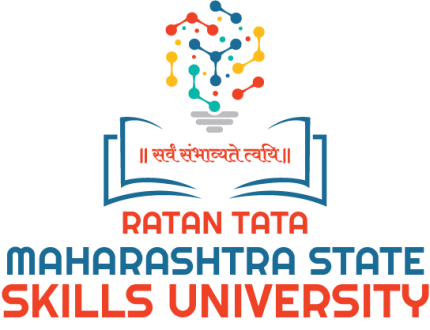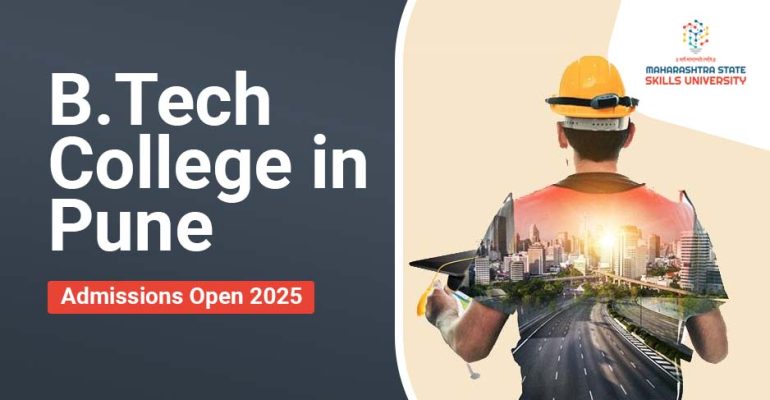B.Tech college in Pune – Admission Open 2025
May 6, 2025 2025-07-05 10:20B.Tech college in Pune – Admission Open 2025
Hey future tech guru! If you’re looking for a B.Tech program that aligns with what today’s industries need, then you should check out Pune. It’s not just a great place to be.
Admissions for 2025 are open at Ratan Tata Maharashtra State Skills University (MSSU), one of the most innovative universities in Maharashtra. Whether you’re interested in creating smart machines, coding apps, or setting up effective IT systems, MSSU has a B.Tech course for you.
Let’s dive into all the details you need to know — from courses and intake to fees and eligibility, plus how to secure your spot. Let’s go!
Courses Offered at MSSU Pune
MSSU’s School of Science, Engineering & Technology Skills (SSETS) has three B.Tech programs that match what employers are looking for:
B.Tech in Computer Technology
This program covers programming, web development, and database design. It’s perfect for anyone looking to become a software developer or who has a passion for tech.
Course Highlights
- Curriculum Focus: Covers programming, web development, database design, and the basics of hardware, software, and networks.
- Skill Development: Students learn to analyze and design solutions for real-life issues, making programs and new ideas for businesses.
- Certifications: There’s a chance to earn certificates in things like CAD & CAM, Python, 3D Printing, and others.
B.Tech in Information Technology
This program is all about IT infrastructure, networking, and system management, getting you ready for jobs in IT support and system administration.
Course Highlights
- Curriculum Focus: We cover a mix of mechanical, electrical, electronics, computer science, instrumentation, and control systems so you can pick up key skills in mechatronics.
- Skill Development: You’ll learn how to create new products and see how mechanical, software, and electronic engineering all work together in production.
- Certifications: You’ll also earn certifications in Cloud Computing, MATLAB, and CLAD.
B.Tech in Mechatronics Engineering
This program brings together mechanical, electrical, and computer engineering, making it a great fit for anyone keen on robotics and automation.
Course Highlights
- Curriculum Focus: The curriculum helps students learn new computer skills, communicate technical concepts to those who aren’t tech-savvy, and combine hardware and software in real-world settings.
- Skill Development: Students will get good at programming in advanced languages and work with both clients and team members to create software that fits what clients need.
- Certifications: You can also earn certifications in areas like CAD, CAM, Python, 3D Printing, and more.
Skill-Based Learning Approach
MSSU takes a balanced approach to learning, with 40% of the time spent in class and 60% on skills and hands-on training. This mix helps students understand the theory while also giving them good practical experience, so they’re ready for the job market when they graduate.
Total Intake
Each program takes in 60 students every year at the Pune campus, which helps keep things personal and fosters a tight learning community.
Fees Structure
The annual fee for each B.Tech program is ₹1,10,000. This fee gives you access to modern labs, industry projects, and practical training opportunities.
Eligibility Criteria
To apply for the B.Tech programs, you need to meet one of these requirements:
- A Higher Secondary Certificate (10+2) with at least 50% marks in Physics, Chemistry, and Mathematics (or 45% for reserved categories) and English.
- ITI (1-year trade) with a year of apprenticeship that’s been certified.
- ITI (2-year trade) plus a certificate equivalent to 12th grade.
- A Diploma in Engineering/Technology from a polytechnic that’s recognized by AICTE, with a minimum of 50% marks.
Also, if you have a diploma, you can directly apply for the second year, which is a quicker option for eligible students.
Admission Process
MSSU has streamlined its admission process to be student-friendly:
- Application Form: Complete the online application available on the MSSU website.
- Entrance Test: Appear for one of the accepted entrance exams—CUET, MHCET, MSSU’s MUET, or JEE.
- Document Submission: Provide all relevant academic and identification documents.
- Statement of Purpose (SOP): Submit an SOP outlining your motivations and goals.
- Interview: Participate in an interview conducted by MSSU to assess your suitability for the program.
The admission is merit-based, considering:
- 30% weightage to the qualifying exam (HSC/ITI/Diploma)
- 30% weightage to the entrance exam
- Remaining weightage distributed among SOP and interview performance
Location Advantage
MSSU’s Pune campus is in a great spot, giving students a chance to connect with the local tech scene and find plenty of internships. The campus has up-to-date facilities, like advanced labs and shared spaces, making it a good place for learning and creativity.
Why Choose MSSU?
- Skill-Based Curriculum: MSSU focuses on hands-on learning, making sure graduates are ready for the job market.
- Industry Integration: Students take part in workshops, internships, and projects with industry partners.
- Flexible Exit Options: After 2 years, students can choose to earn a Diploma, after 3 years a B.Voc, or they can complete the full 4-year B.Tech program.
- Placement Support: There’s a dedicated placement team to help students land jobs at top companies.
Starting a B.Tech at MSSU Pune is more than just getting a degree; it’s about gaining the skills and experiences that help you stand out in the tech world. With a curriculum aimed at what the industry needs and an emphasis on practical learning, MSSU gets you ready for your career.
Ready to take the next step? Visit our official website to apply now and secure your spot for the 2025 intake!
Frequently Asked Questions
Is there a scholarship available for economically weaker students?
Answer:Yes, eligible students can apply for state or central government scholarships. MSSU follows official norms and assists in the application process.
Can I switch my B.Tech branch after the first year?
Answer:Branch changes may be allowed based on academic performance, availability of seats, and approval by the university after the first year.
Does MSSU offer industry certifications along with the B.Tech degree?
Answer:Yes, MSSU integrates additional skill-based and industry-recognized certifications to enhance employability and practical exposure alongside the main B.Tech curriculum.
Are weekend or part-time B.Tech classes available for working students?
Answer:No, MSSU’s B.Tech programs are full-time, with regular classes and labs designed to ensure immersive, hands-on learning throughout the academic year.
What kind of internships do students get during the B.Tech course?
Answer:Students receive internships with IT companies, startups, and manufacturing firms through industry tie-ups focused on real-time problem solving and applied learning.
Do I need to know coding before joining B.Tech in Computer Technology?
Answer: No coding background is required. The curriculum starts from the basics, making it suitable for beginners and gradually advancing to complex programming concepts.
Is the MUET entrance exam difficult to crack?
Answer:MUET is designed to assess your aptitude and academic basics. With focused preparation in maths and reasoning, it’s very approachable and student-friendly.
How often do practical labs or hands-on sessions happen at MSSU?
Answer:Practical sessions are held regularly, often weekly, as MSSU emphasizes skill-based learning through live projects, lab experiments, and industry-driven assignments.
Does MSSU offer clubs or technical societies for students?
Answer:Yes, MSSU encourages participation in tech clubs, coding groups, innovation cells, and events to promote leadership, teamwork, and extracurricular engagement.
Can international or NRI students apply for B.Tech programs?
Answer:Yes, MSSU accepts international and NRI applications. The eligibility criteria remain the same, with some variations in document verification and the admission process.




